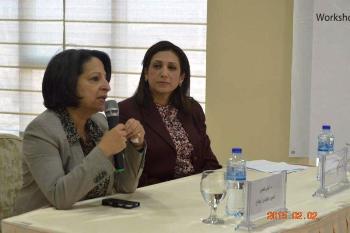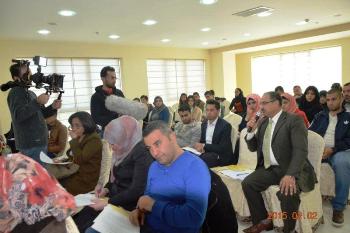|
MIFTAH announces the survey results on the perceptions of university students Youth and women political participation
Ramallah - MIFTAH and the Palestinian Central Bureau of Statistics (PCBS) announce survey results on the perceptions of students in Palestinian universities and academic institutes on political participation in 2014, as part of its programme to promote young women political leaders. The project is in partnership with and funded by The United Nations Development Programme (UNDP/PAPP). Dr. Feidy: A qualitative survey MIFTAH CEO, Dr. Lily Feidy, opened the workshop on 2.02.2015, by affirming that the survey is not the final results. A comprehensive analysis of the results will be conducted. She stressed that the survey was the first of its kind in Palestine and a first for MIFTAH as well. Feidy said she hopes youth institutions and Palestinian political parties would benefit from the survey. “The statistical data should be cleverly dealt with and the survey’s results should be taken very seriously,” she said. She announced that another workshop would be held at a later date to present and discuss in depth the analytical results of the survey.. Dr. Feidy thanks UNDP for its support in this endeavor. Awad: a unique experience The Head of the PCBS, Ola Awad highlighted the survey results, explaining that the survey was a collaboration between MIFTAH and the Bureau, adding that this was one of the most unique experiences. Awad said the indicators of the survey represent students’ political and cultural approaches and the extent of their knowledge of the legal framework and Bylaws of political movements, student blocs and student councils. It also measured the extent of awareness among students of the concept of citizenship in terms of its rights and obligations, in addition to political participation and the mechanisms in place for this participation. In addition, the survey explored the students’ knowledge of movements and student council programs and the factors that affect the scope of political participation, along with empowerment and awareness programs.
 Survey findings and results Both male and female students from students councils enrolled in the 2013/2014 academic year from universities, colleges and academic institutes in the West Bank and Gaza Strip were surveyed. The sample size is estimated at 1,283 students with an overall response rate of 94.2%. Interest in discussing political topics The findings indicated that 73.0% of students had an interest in discussing political issues with others with a disparity in the level of interest (largely interested, moderately interested or limited interest) with a ratio of 79.1% males and 68.5% females. Knowledge of rules and regulations The survey showed that approximately half of the students, or 51.2%, were aware that rules and regulations govern the work of student movements: 63.23% of males and 42.1% of females. Furthermore, 63.4% of the students said they know these rules and regulations: 72.7% of males and 58.4% of females. In response to the question whether these rules and regulations provide the space for active participation of females within these movements and student blocs, 71.0% said they did: 66.6% of males and 76.0% of females. Contrarily, 24.6% said they did not provide the space for active female participation: 28.2% males and 20.3% females. 4.4% said they did not know. Knowledge and awareness among females of rights and duties towards society The survey showed that 60.9% of students said females have sufficient knowledge and awareness of the rights and duties towards society: 62.2% of males and 59.9% of females, while 37.7% of the students surveyed said females are not aware of these rights and duties : 35.6% of males and 39.2% of females; 1.4% said they did not know. In terms of female participation in political activity, 26.5% of the students said their participation is sufficient: 28.2% of males and 25.3% of females. 70.2% said their participation is insufficient: 67.9% of males and 71.9% of females, while 3.3% said they did not know.
 Political leaders in the Palestinian arena The survey showed that 48.0% of students said political leaders in the Palestinian arena were from the older generation: 56.6% of males and 41.5% of females. 44.0% of the surveyed students said political leaders are a mixture of young and old: 35.7% of males and 50.4% of females. Only 7.3% said political leaders are young, with the same male/female ratio. 0.7% of those surveyed said they did not know. In response to the question of whether there is a gap between the younger and older generation leaders, 77.5% said there was a gap: 79.5% of males and 75.9% of females. 20.2% said there was no gap: 18.9% of males and 21.3% of females. 2.3% said they did not know. Equality between the sexes in accessing public services Results also showed that 77.6% of those surveyed said males and females were equal in society in terms of obtaining a higher education with the same male/female ratio. 19.0% said there was equality between the sexes regarding freedom to leave the home: 14.3% of males and 21.5% of females. Furthermore, 81.0% of students said there was equality in society between the two sexes in terms of accessing public services, with a ratio of 83.4% males and 78.6% females. Desire for political participation Results showed that 38.7% of surveyed students had a desire for political participation: 49.5% of males and 30.6% of females. As for the sources of their political nurturing, the family scored the highest rate at 37.2% with a ratio of 35.4% males and 38.7% females. Media came in second place at 31.1%: 29.5% of males and 32.2% of females. Political parties came in third at 16.9% with a ratio of 21.9% males and 13.1% females. Educational institutions scored 12.2%: 10.2% of males and 13.7% of females, while religious and other institutions received 2.7% at a ratio of 3.0% males and 2.4% females. Student council elections as a gauge for the street 26.2% said they considered themselves activists in student activities: 34.5% of males and 19.9% of females. A total of 47.5% participated in the most recent elections at their universities and institutes at a ratio of 54.8% males and 42.0% females. Regarding the results of the last student council elections, 61.9% of students who participated said they were satisfied with the results: 56.2% of males and 67.5% of females. As to whether the student council results can be seen as a gauge for views on the Palestinian street, 52.0% said they were a gauge: 54.1% of males and 50.3% of females. 43.3% said they did not consider them a gauge, at a ratio of 42.7% males and 43.7% females. 4.7% said they did not know. Impact of the family or social surrounding on the scope of political participation According to the survey results, one the most important factors that affect the scope of political participation among students is the family or their surroundings, at 87.1%: 86.9% of males and 87.4% of females. This is followed by affiliation to student blocs at 80.4%: 85.7% of males and 76.4% of females. Having free time was the next factor at 68.3% at a ratio of 69.3% males and 67.5% females. Furthermore, 72.7% of students said political participation in student activities is an expression of citizenship, while 70.4% said it was based on ideologies and 66.2% said it was a national duty.
http://www.miftah.org |